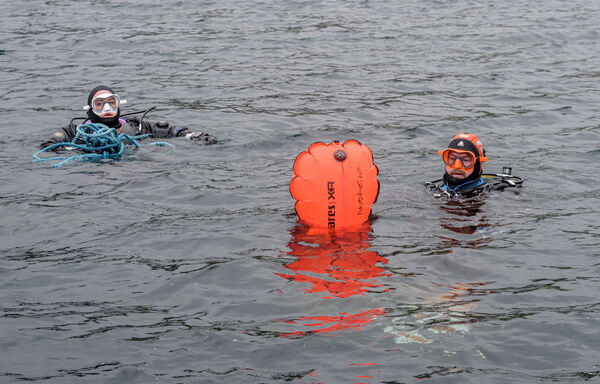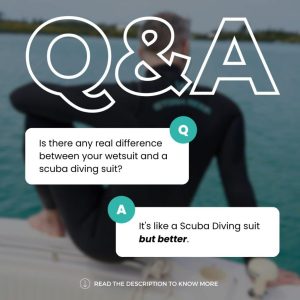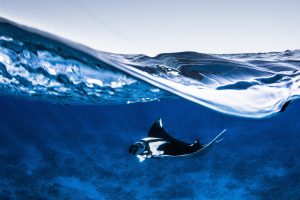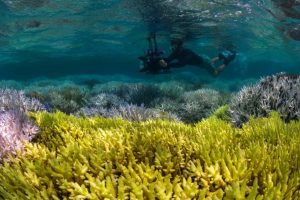Deep sea divers will for the first time take our nationwide beach cleans underwater. A team of specially-trained divers will this spring begin diving as deep as 30m around our entire coast to collect hazardous waste.
While land-based beach cleans of plastic bottles and crisp packets are what we are used to, dumped fishing gear is the biggest plastic polluter in our seas and oceans.
The team of scuba divers will work with the Irish chapter of marine conservation and activism organisation Sea Shepherd, as part of their international Ghostnet campaign. It is the first time these dives are taking place in Ireland.
“A ghost net is a discarded fishing net, it can be damaged and discarded, it could be lost at sea, sunk and not retrieved,” explained Emma Tuite, director of Sea Shepherd Ireland.

“They are like curtains of death, they float in the water like the way a ghost would float and wildlife gets caught in it. They’re very harmful to mammals, and also birds as their necks get caught and they drown. They’re a massive problem all over the world,” she added.
A recent report from Greenpeace found that “ghost gear” is the biggest plastic polluter of the oceans.
More than 640,000 tonnes of nets and other commercial fishing gear are dumped or lost in the sea every year — the same weight as 55,000 double-decker buses.
Academic research has also found that in some places this “ghost gear” accounts for 52% of plastic waste in our seas, as evidenced in the Great Pacific Garbage Patch.

Ireland’s problems match up with international findings.
“The biggest problem is not on the surface, it’s below the surface, and it’s the nets — 70% of marine life entanglement is due to fishing nets being discarded,” said Ms Tuite.
“In Ireland, there has been a 200% increase in the number of seals dying as a result of marine waste from 2021 to 2022. We don’t have final figures for 2023,” she added.
Marine waste includes nets, traps, lobster pots, ropes, and lines.
“Everyone is worried about straws, but it’s the nets. I say to volunteers at the end of a beach clean ‘take two breaths, that second breath is courtesy of the ocean’, if the ocean dies we die,” said Ms Tuite.
According to the United Nations, 25% of all carbon emissions is absorbed by our oceans, and in turn, they generate 50% of our oxygen supply.
“This will be the biggest ever initiative to future-proof Irish waters, alongside the work of protecting marine areas,” said Sea Shepherd Ireland director.

Ciaron King will be one of the nine divers heading below the surface of our waters to carry out this work.
“In Irish waters at 30 metres, it’s dark and there are currents. So if there is a net and it’s caught, if you just go in and start cutting stuff it will get loose and start moving around you. You could get caught up in it,” explains Mr King, diving instructor and founder of Nauti Divers in Dun Laoghaire.
Mr King was involved in training a team of divers in Ireland in this Scuba Diving International ratified course.
“For ghost net recovery you will work in a team of three. There will be one observer to watch as the net moves and two operators and between them they share the role of cutting the net and using lift bags,” explained Mr King.
“They will have specific missions, certain sites around Ireland where fishermen will have reported losing nets or pots,” he added.
T

o become a volunteer, divers will need to be over 21 years of age and trained to the minimum level of rescue diving. They will also need to have logged 100 dives and be certified to 30 metres.
Before any dive occurs, a plan will be made after checking the weather and researching the area. All ghost net recovery dives will need to be sanctioned in advance.
Mr King said with clubs all over Ireland such as Oceandivers and Triton Diving in Dublin, Ocean Addicts Southwest in Cork, or Portroe Dive Centre in Tipperary, there are lots of people scuba diving here, so if anyone does not yet meet the requirements they can be trained up by Sea Shepherd Ireland.
He said diving in Ireland is safe as long as you follow the rules and go with others.
“In Dublin Bay, there is a mist, and mostly it’s visibility of a metre, however, divers carry torches. If you get to the bottom of the seabed there’s an abundance of life.
“Then on the northwest coast, you’ve visibility of 30 metres. It’s one of my favourite places to dive and I’ve done the Maldives and The Galapagos. Donegal has fantastic topography. Diving in Ireland is some of the best in the world, with underwater caves and cliffs off Galway too,” said Mr King.

This new campaign will be “Ireland’s biggest ever beach clean underwater”, said Ms Tuite, and just like all other beach cleans, everyone can get involved.
“It’s not just divers, we need volunteers onshore, on top of the boat to take waste from divers, and we need a place to store the nets,” Ms Tuite said.
It also does not stop at just storing the nets, the soon-to-be retrieved plastic already has its future mapped out.
“We will be in touch with companies that can take the bails of nets and upcycle and recycle them into another product — longer life products such as furniture, bikes, hammocks, and bags. There are companies that specifically take this marine waste,” said Ms Tuite.
And this is as much about the climate and the circular economy as it is about the community.
“It’s not just us who want to save the oceans, it’s our fishermen — it’s their livelihood, the artisan fishermen of Ireland. It’s about trying to protect their livelihoods and the food they bring into our communities,” said Ms Tuite.



